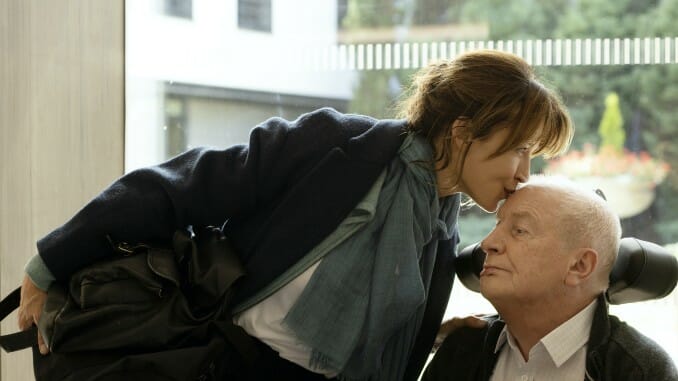Restrained End-of-Life Drama Everything Went Fine Finds Poignant Realism

Since the start of 2016, François Ozon has made a delicate black-and-white period drama (Frantz), a startlingly graphic erotic thriller (L’Amant Double), a searing true-life story of the damage perpetrated by abusive Catholic priests (By the Grace of God) and a queer coming-of-age romance (Summer of 85). That’s just within the last half-decade of a career that’s spanned a quarter century; there are few directors working today with an output as prolific, varied or continually high quality.
Ozon’s latest is Everything Went Fine, based on the memoir by friend and frequent collaborator Emmanuèle Bernheim, who died in 2017. Emmanuèle (played by Sophie Marceau) and her sister Pascale (Géraldine Pailhas) are thrown off balance one day with the news that their aged father André (André Dussollier) has suffered a serious stroke. There’s a further shock to come: When he’s recovered enough to regain his speech, he tells Emmanuèle that he wants to end his life, and needs her to help him do it.
Although both sisters are aghast at the idea, they nonetheless decide to respect his wishes and go about arranging the necessary trip across the border to Switzerland. While undertaking the complex, risky planning, Emmanuèle confronts her feelings towards a father who’s never been very fatherly, hoping to achieve a peaceful end to their fractious relationship before it’s too late.
An early run of provocative movies like Sitcom and Criminal Lovers lent Ozon the reputation of being an enfant terrible; Everything Went Fine makes those days seem long ago. It’s the work of a mature filmmaker, far more concerned with the respectful telling of his friend’s story than any need to shock or provoke. Set largely over a Parisian autumn and winter, the action takes place in hospital rooms, upscale restaurants and handsomely furnished apartments. Naturalism is key here; there are few stylistic flourishes, or—despite the emotional subject matter—high-key confrontations. This is a film driven by honest, thoughtful dialogue and a beautifully-drawn complexity of feeling.
Which is all well and good. Truly. But amidst that admirable refinement, you might well start yearning for something a little more…involving. The continual insistence on reserve means Everything Went Fine’s dramatic stakes sometimes suffer. Any resistance to the assisted suicide is swiftly overturned: The movie’s aversion to conflict results in four separate instances of a sister storming out of a room to prevent an argument. That André never either wavers from his commitment to death, or apologizes for the hurt he’s caused his daughters, makes him a frustratingly static character. Ozon not wanting to tamper with the truth of his friend’s deeply personal story for the sake of adding narrative pizazz is both understandable and correct, and yet the relentless restraint of the production can cause the pace to drag.
-

-

-

-

-

-

-

-

-

-

-

-

-

-

-

-

-

-

-

-

-

-

-

-

-

-

-

-

-

-

-

-

-

-

-

-

-

-

-

-








































